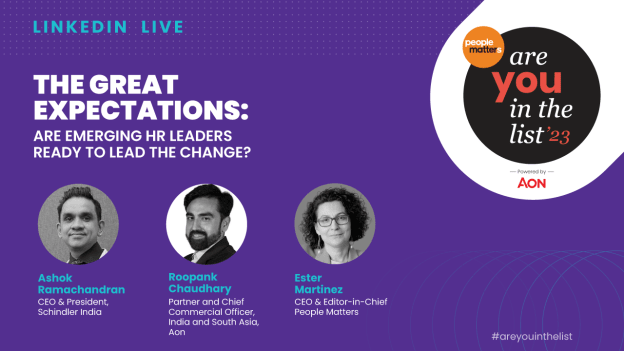The great expectations: Are emerging HR leaders ready to lead the change?

With the business world in flux, HR leaders are grappling with various challenges, such as talent competition, cost control, and the growing influence of AI and automation. To navigate this dynamic environment, HR professionals must have a strategic mindset, expertise in change management, and the ability to think creatively to design a future-proof people strategy that can adapt to the changes in the business model.
But are the emerging young HR professionals ready to take on these challenges?
In a recent LinkedIn Live, the leaders behind People Matters Are You In The List 2023, powered by Aon, addressed the evolving expectations from future HR leaders and shared the key skills and competencies they are looking for in these professionals through the most awaited awards.
Here are some excerpts from the conversation between Ashok Ramachandran, CEO & President, Schindler India, and Roopank Chaudhary, Partner and Chief Commercial Officer, India and South Asia, Aon, moderated by Ester Martinez, CEO & Editor-in-Chief, People Matters. Click here to watch the complete video.
The current scenario
Today’s HR community is grappling with lots of challenges such as business model changes, talent shortages, cost management, enabling top-line growth, optimising productivity, and using technology to redefine work.
“This results from the consolidation of obsessive growth and the increased focus on profitable and stable growth”, believes Ashok.
Even established organisations had to lay off people due to the artificial boom being course corrected. Yet, the strong focus on sustainability and agility presents huge opportunities for emerging economies and highly skilled people.
Roopank mentions, “Much of India’s growth story has been around the domestic sector such as FMCG, manufacturing, cement, auto, real estate, pharma, retail, and telecom. These were hit during the pandemic but bounced back with high salary increments than before. On the other hand, sectors like IT and consulting which are globally linked are still struggling.”
The bottom line is continued uncertainty with the bust-and-boom cycle repeating much faster. Businesses and employees have to be resilient to weather these shocks. Here, HR comes in as a strategic enabler to help deal with uncertainty and will be a key differentiator in filtering out people and businesses that will thrive and those that will struggle to survive.
The future of HR
Ashok believes that the HR function is more ready in dealing with uncertainty, from a hardware perspective such as analytics tools, software etc. But what needs to improve is the mindset. “HR is a challenging job from a human emotions perspective. People are in dichotomy, and this brings more onus on HR leaders," he added.
We must focus on the softer part of HR, creating mobility and growth opportunities amidst the challenges of attrition and talent shortage. Roopank outlines the top skills HR leaders must have as we foray into the future.
- Understand the linkage to business context: HR leaders must understand how businesses and their needs change, and be able to link functional HR to business. This will help HR move away from enabling execution and seek a strategic seat at the table. Roopank shares, “Some of the best HR leaders come from business. HR is not about managing people, it is about working with people to solve business problems”. Ashok suggests HRBPs to be active in attending business meetings, sales meetings, visit customers etc. At Schindler, HR teams shadow the sales and operations teams, even learning how to install elevators. As a result, they understand the sense of urgency, and become even more productive.
- Build workforce resilience: HR must be able to enable teams and businesses to bounce back from crises by building talent from within. Another key ask is to help people and organisation bounce forward by investing in job architectures and careers. This is critical, because the #2 reason why people leave is ‘lack of career growth’ (Roopank). Above all, HR must work around a ‘shared belief’ by designing a holistic EVP which acts as the glue that gets people together.
- Build manager capability: Ashok believes that ‘manager’ is a key reason for people to leave. Roopank agrees with Aon data - ‘manager capability’ is the #4 reason why people leave. Hence, equipping the manager to work with people and enable right performance conversations is a must. HR needs to train managers so that they can deal with diverse and hybrid workforces.
- Functional skills: Some of the core skills required are agility and HR tech savviness. Only then, the customer experience will translate to the employee experience.
HR should empower themselves with these skills for decision-making and strategic work.
HR to business mindset: Driving skills transferability
Often, the main hindrance in building strategic HR skills is that CEOs do not give power to HR. Ashok believes that this is a two-way street and may work if HR demonstrates a P&L perspective.
He shared, “We moved our Operations Head to HR and he brought in a KPI-tracker. When he initially asked people their weekly targets, they were not used to this question."
It is about bringing about a mindset change in HR. For example, don’t use traditional forms of hiring, the best people are not looking for jobs, they are passively sitting. So HR needs to go and find them”, says Ashok.
Such progress is possible if HR and business leaders have an open mind and are not scared of failing. Roopank believes that mobility from business to HR roles is restricted because people have an inherent resistance to HR as a support function.
“Only when you start to bring in the strategic part of HR, is where you make HR more attractive for business people to move into”, shares Roopank.
Organisations must build a future-forward career architecture not just for moving upwards, but a holistic career mapping for moving across. Create an environment where people work not only for money but to get diverse skills and experience.
The current challenge is convincing managers to let go of their people. Ashok agrees that very few organisations drive succession planning as an active KPI and hence at the ‘moment of need’, the person is not ready. HR must design processes that are future-relevant yet realistic.
The mindset shift shall begin at home i.e. driven by HR professionals themselves.
Ashok says, “One has to have an interest in learning about the organisation as a whole”.
Ashok says, “Employees should not come to work thinking ‘I am in HR’, they should think about ‘I run this company’. HR folks cannot be sitting far removed in the head office, they have to be out there, with the people, hands-on."
HR leaders must pick up one or two things and make significant impact and progress in those areas, believes Roopank. Such role-model stories will create an impact that the market will follow, and success will be in every function. Such an entrepreneurial perspective will enable HR to become a true business partner.
It is absolutely critical that we invest in preparing the young HR leaders of today for the unconventional times ahead. It was with the same goal in mind that People Matters Are You In The List was launched 12 years back!
Over the years, these awards have become the beacon to identify a handful of talent powerhouses who are bold, courageous, resilient and future-forward. Much more than awards Are You In The List is a journey of discovery and growth. This year the entire awards process is taken to the next level with Aon, making it more relevant to test the critical competencies required for 2023 and beyond. Linked to Aon’s HR competency framework, the assessments will be built on three pillars: Business Acumen, Effective Partnership and Technical acumen.
Many HR professionals who have been part of the list have now made their way to the top rung of management as HR Heads or Function Heads. In the past 11 years, out of 21,659+ applications, 166+ leaders have made it to the final list. Apply now and join the league of emerging HR professionals!
Click here to learn more.













